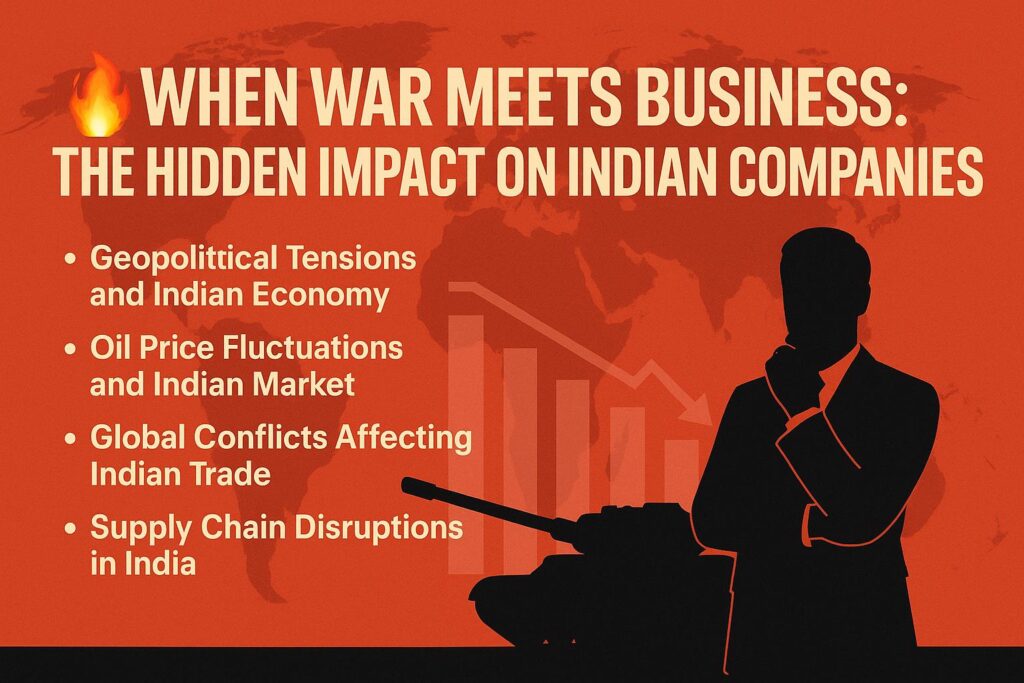War Impact on Indian Business
Global conflicts have far-reaching consequences, and Indian businesses are not immune. From rising oil prices to disrupted supply chains, the ripple effects of war can be felt across various sectors of the Indian economy. Understanding these impacts is crucial for businesses to navigate uncertainties and strategize effectively.
Geopolitical Tensions and Indian Economy
India’s economy is intricately linked to global events. Geopolitical tensions, such as the Russia-Ukraine conflict, have led to increased crude oil prices, directly impacting India’s import bills. As India imports over 80% of its oil requirements, any disruption in global oil supply chains can lead to inflationary pressures domestically.
Additionally, conflicts can lead to currency fluctuations. The Indian rupee often depreciates during global uncertainties, making imports costlier and affecting the balance of trade.
Global Conflicts Affecting Indian Trade
Wars and conflicts can disrupt global trade routes, affecting India’s exports and imports. For instance, the Israel-Hamas conflict led to a significant drop in India’s exports to Israel by 63.5% during a fiscal period. Such disruptions not only affect trade volumes but also strain diplomatic relations and economic partnerships.
Furthermore, increased insurance costs and risk premiums during conflicts make international trade more expensive and less predictable for Indian businesses.
Oil Price Fluctuations and Indian Market
Oil price volatility is a significant concern for India. Conflicts in oil-producing regions, like the Middle East, can lead to supply disruptions, causing global oil prices to spike. Such increases impact transportation costs, manufacturing, and even agriculture, leading to broader economic implications.
For example, during the Iran-Israel conflict, Brent crude prices rose by over 6% in two weeks, surpassing $90 per barrel. Such spikes strain the Indian economy, leading to increased fuel prices and inflation.
Supply Chain Disruptions in India
Global conflicts can severely disrupt supply chains. The Russia-Ukraine war, for instance, affected the global supply of fertilizers and edible oils, commodities that India heavily relies on. Such disruptions lead to shortages and increased prices domestically.
Moreover, sectors like pharmaceuticals, which depend on raw materials from conflict zones, face production challenges. Delays and increased costs in procurement can hamper the industry’s growth and reliability.
Indian Stock Market Response to International Conflicts
The Indian stock market is sensitive to global events. During conflicts, investor sentiment often turns cautious, leading to market volatility. For instance, during the initial days of the Russia-Ukraine war, Indian markets experienced significant fluctuations.
However, India’s market has shown resilience in the face of global uncertainties. Strategic sectors like IT and pharmaceuticals often act as stabilizers, attracting investments even during turbulent times.
Challenges Faced by Indian Exporters During Geopolitical Crises
Exporters face multiple challenges during global conflicts:
-
Logistical Hurdles: Disrupted shipping routes and increased freight costs.
-
Payment Delays: Financial sanctions and banking restrictions in conflict zones.
-
Demand Fluctuations: Reduced demand from war-affected regions.
-
Regulatory Changes: Sudden changes in trade policies and tariffs.
These challenges necessitate exporters to diversify markets and build more resilient supply chains.
Conclusion
Global conflicts undeniably impact Indian businesses across sectors. While challenges are manifold, they also present opportunities for resilience and innovation. By understanding these impacts, businesses can strategize to mitigate risks and harness potential growth avenues.
📣 Want Your Business to Stay Future-Ready?
Stay informed and smart with timely updates on economic shifts and market strategies. Subscribe to our newsletter now and keep your business one step ahead of global disruptions!


